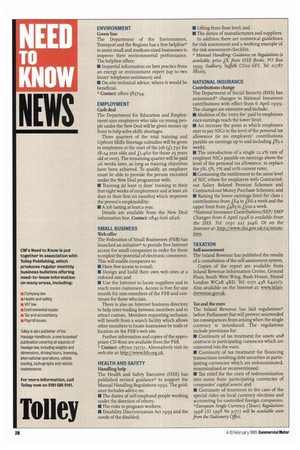T o ll ey
Page 30

If you've noticed an error in this article please click here to report it so we can fix it.
ENVIRONMENT Green line
The Department of the Environment, Transport and the Regions has a free helpline* to assist small and medium-sized businesses to improve their environmental performance. The helpline offers:
• Impartial information on best practice from an energy or environment expert (up to two hours' telephone assistance); and • On-site technical advice, where it would be beneficial. * Contact: o800 585794.
EMPLOYMENT Cash deal The Department for Education and Employment says employers who take on young people under the New Deal will be given money up front to help solve skills shortages.
Three quarters of the total training and Upfront Skills Shortage subsidies will be given to employers at the start of the job (11,730 for 18-24 year olds and £1,460 for those 25 years old or over). The remaining quarter will be paid 26 weeks later, as long as training objectives have been achieved. To qualify, an employer must be able to provide the person recruited under the New Deal programme with: • Training (at least 15 days' training in their first eight weeks of employment and at least 26 days in their first six months) which improves the person's employability; • A job lasting at least a year.
Details are available from the New Deal information line. Contact: 0845 606 2626.
SMALL BUSINESS Web offer The Federation of Small Businesses (FSB) has launched an initiative* to provide free Internet access for small companies in order for them to exploit the potential of electronic commerce. This will enable companies to: • Have free access to e-mail; • Design and build their own web sites at a reduced rate; and • Use the Internet to locate suppliers and to reach more customers. Access is free for one month for non-members of the FS B and continues for those who join.
There is also an Internet business directory to help inter-trading between members and to attract custom. Members requesting inclusion will benefit from a search facility which allows other members to locate businesses by trade or location on the FS B's web site.
Further information and copies of the appropriate CD-Rom are available from the F S B.
* Contact: 08700 731731. Alternatively visit its web site at: http://www.fsb.org.ulc.
HEALTH AND SAFETY Handling help The Health and Safety Executive (H SE) has published revised guidance* to support the Manual Handling Regulations 1992. The guidance includes advice on: • The duties of self-employed people working under the direction of others; • The risks to pregnant workers; • Disability Discrimination Act 1995 and the needs of the disabled; • Lifting from floor level; and • The duties of manufacturers and suppliers. In addition there are numerical guidelines for risk assessment and a working example of the risk assessment checklist.
* Manual Handling: Guidance on Regulations is available, price f8, from HSE Books, PO Box 1999, Sudbury, Suffolk COto 6FS. Tel: 01787 88n65.
NATIONAL INSURANCE Contributions change
The Department of Social Security (D SS) has announced* changes to National Insurance contributions with effect from 6 April 1999. The changes are extensive and include:
• Abolition of the 'entry fee' paid by employees once earnings reach the lower limit; • An increase the point at which employers start to pay NICs to the level of the personal tax allowance (ie no employers' contributions payable on earnings up to and including 183 a week);
NI The introduction of a single 12.2% rate of employer NICs payable on earnings above the level of the personal tax allowance, to replace the 3%, 5%, 7% and to% current rates;
• Containing the entitlement to the same level of N IC rebate for employers with Contractedout Salary Related Pension Schemes and Contracted-out Money Purchase Schemes; and
• Raising the lower earnings limit for class contributions from £64 to £66 a week and the upper limit from f485 to £500 a week. *National Insurance Contributions/SSP/ SMP Changes from 6 April 1998 is available from the DSS. Tel: 0191 225 3246. Or on the Internet at: http://www.dss.,gov.uk/calnirate.
1701
TAXATION Self-assessment The Inland Revenue has published the results of a consultation of the self-assessment system.
Copies of the report are available from Inland Revenue Information Centre, Ground Floor, South West Wing, Bush House, Strand London WC2B 4RD. Tel: 0171 438 6420/5. Also available on the Internet at: www.inlandrevenue.gov.uk.
Tax and the euro The Inland Revenue has laid regulations* before Parliament that will prevent unintended tax consequences from arising when the single currency is introduced. The regulations include provisions for:
• Continuity of tax treatment for assets and' contracts in participating currencies which are converted into the euro;
• Continuity of tax treatment for financing transactions involving debt securities in participating currencies which are redenominated, renominalised or reconventioned;
• Tax relief for the costs of redenomination into euros from participating currencies of companies' capital assets; and • Continuity of treatment in the case of the special rules on local currency elections and accounting for controlled foreign companies. *European Single Currency (Taxes) Regulations 1998 (SI 1998 No 3177) will be available SOOri from the Stationery Office.








































































































